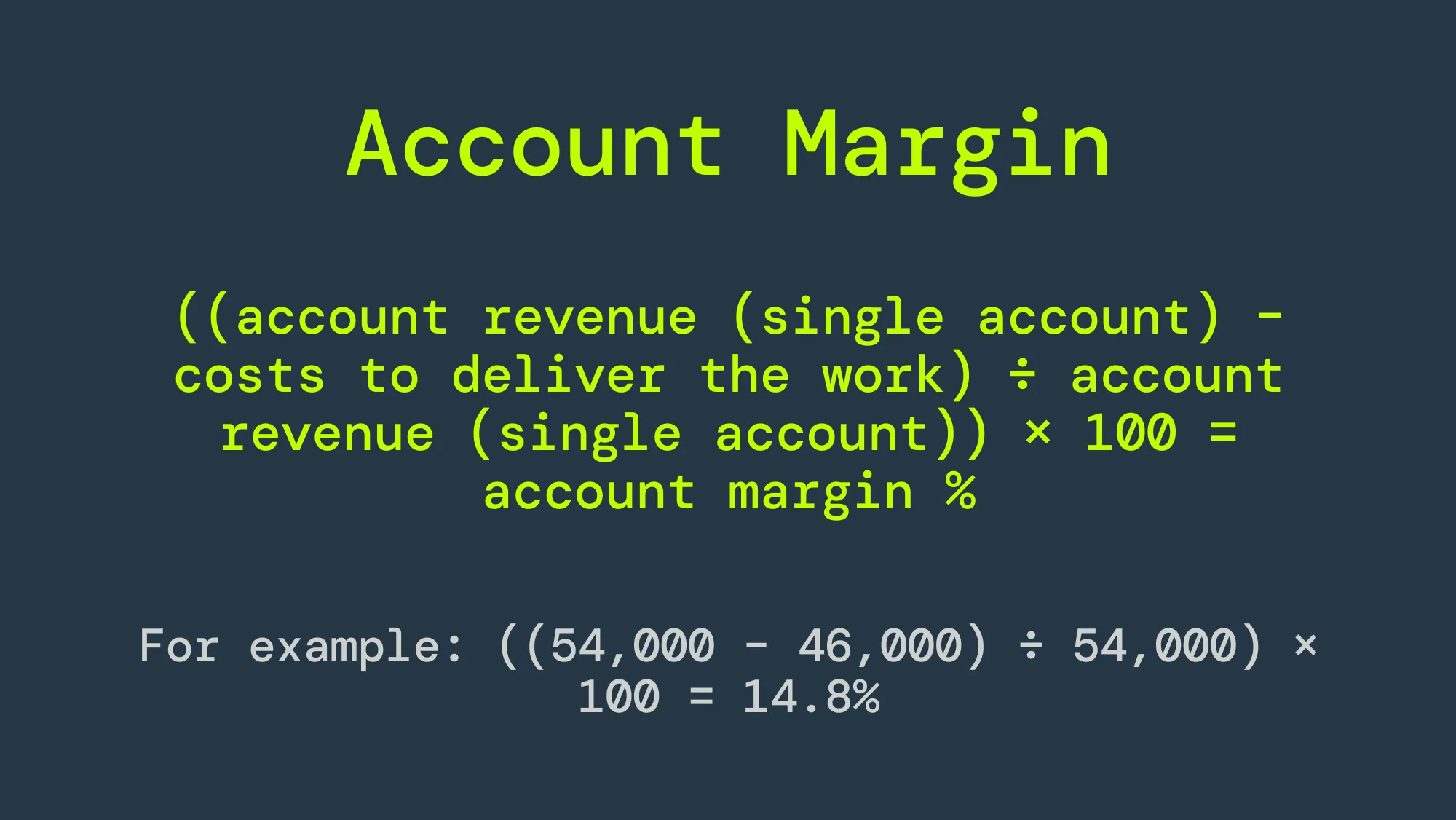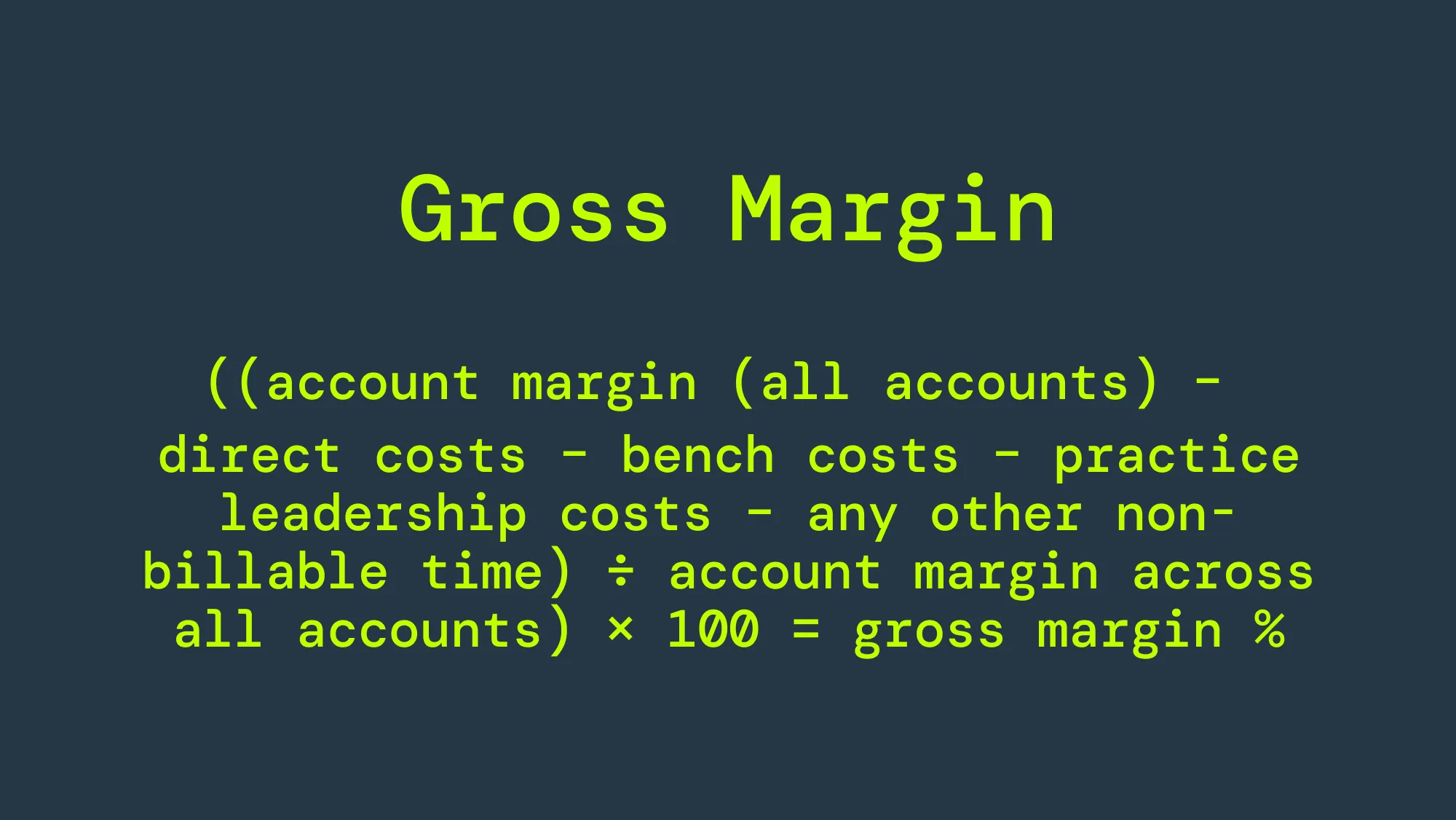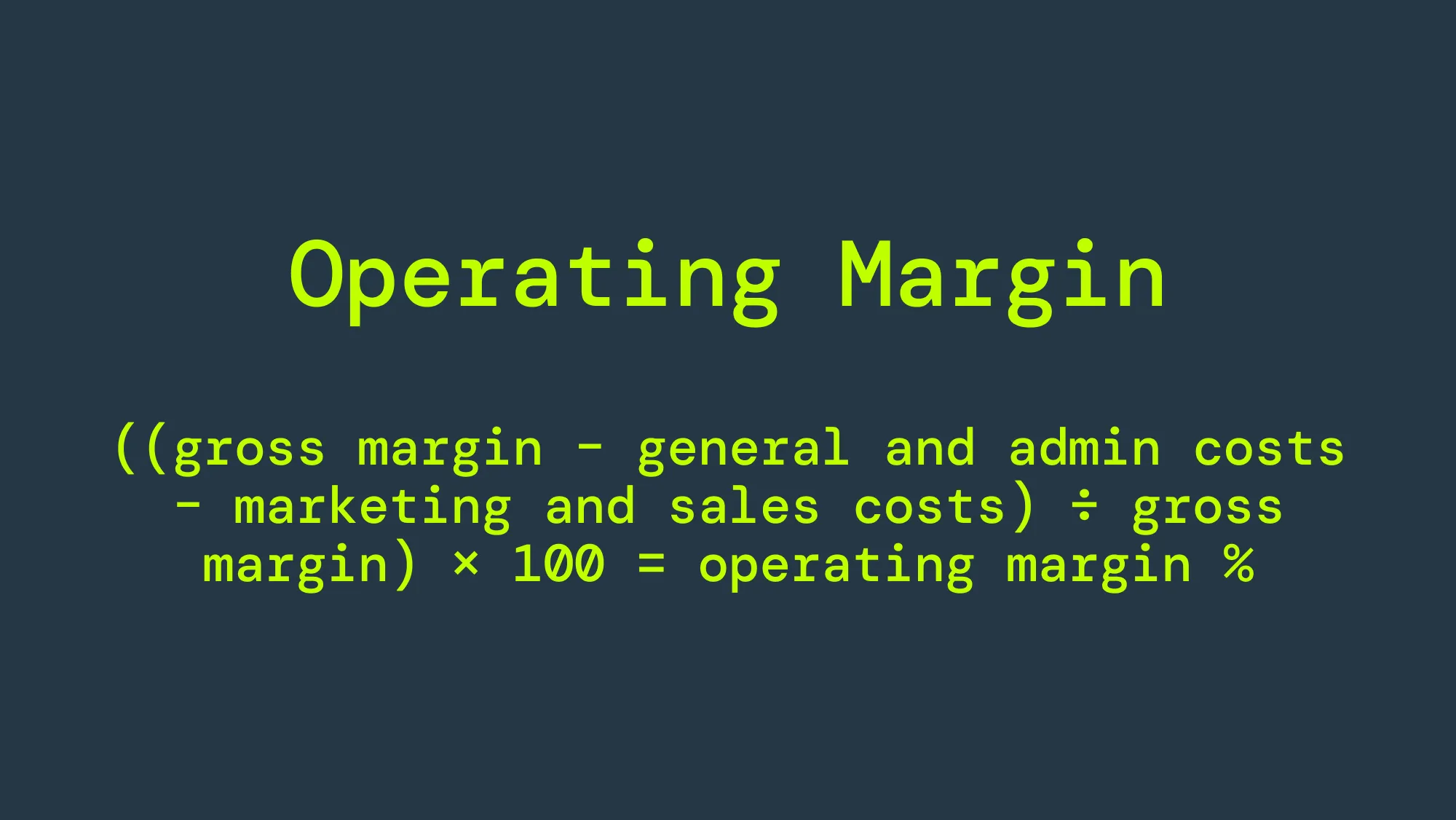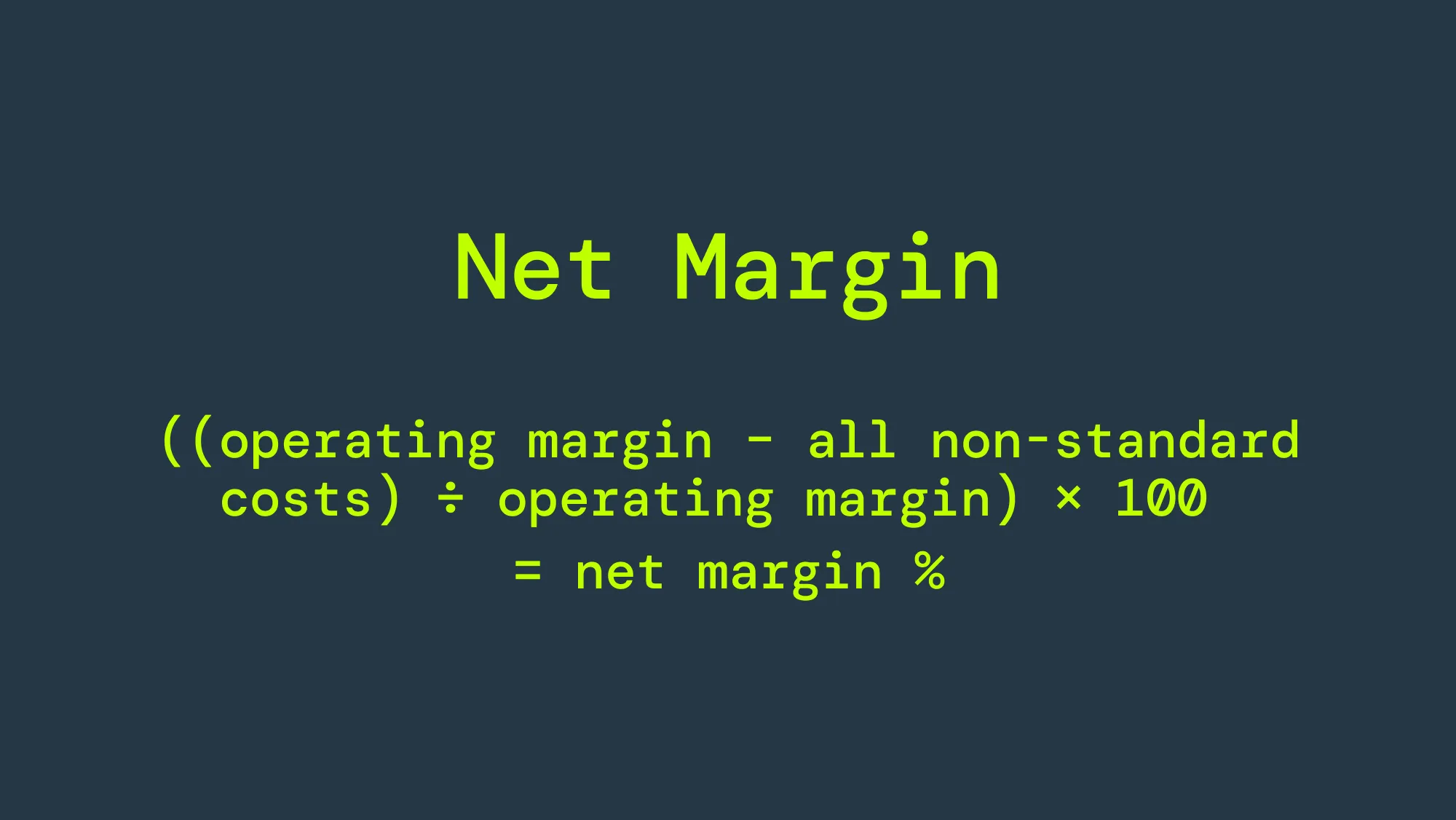How to calculate your margin
%20(1).png)
Interested in how to calculate your margin? We’ve got you covered. Learn the formulas and strategies high performing consultancies use to track and grow their margin, including where PSA software makes the difference.
Regularly checking your margins is crucial for keeping your professional services firm financially healthy. Your gross margin is the gap between your income and expenses. You can analyze it from various perspectives, such as individual, project, or overall company. Gross margin differs from net margin, which factors in allocated overhead and indirect costs.
Through calculating and regularly monitoring your margin, you gain valuable insights into the financial health of your business.
Learn more: What margin should my firm have?
In this article, you’ll learn:
- The difference between gross margin and net margin
- What to include in gross margin calculations
- The definition of a load factor
- Whether you should create a load factor
- How to account for practice leadership time in your margin calculations
- Where PSA software makes the difference for consulting firms
How do margin definitions change when talking about services firms?
At a high-level, services executives might discuss four different types of margin, moving from the account level right up to the company’s overall margin.
Account Margin
Account margin will be of particular interest to account and project managers in your company. This measure helps you figure out which clients are most profitable and which ones might be losing you money.
When calculating account margin, you are solving for the margin of a single account (or client). To do this, you subtract any direct costs associated with the account from the revenue generated by that account.
Calculation: ((account revenue (single account) – direct costs to deliver the work) ÷ account revenue (single account)) × 100 = account margin %

Direct costs are those you incur when delivering a specific project such as time and expenses. They may include:
- Consultant wages
- Subcontractor costs
- Material costs (expenses)
- Travel costs (expenses)
- Project-specific tools (e.g. a software purchased to complete the project)
When calculating account margin, each firm decides whether to load in the indirect costs per person here or at the gross margin level.
To load in indirect costs, you’ll need to create a load factor.
Creating a load factor
Load factors account for additional employee costs, like payroll taxes and benefits.
Payroll taxes and benefits charged to the account would only be for the people who are working directly on the account. In the US, there are person-specific taxes that the employer pays and person-specific costs for benefits, so these are easy to separate out.
Load factors are often realized by applying a percentage to employee costs. A load factor helps you to determine the true cost of an employee.
You may not be aware that there can be different levels of load.
- Basic - payroll taxes, benefits, PTO/leave
- More advanced - training time, practice development (e.g. interviewing to build the firm)
Want to calculate your account margin? Use our interactive calculator
Gross Margin
In contrast to account margin, which calculates margin per account, gross margin calculates the margin across all accounts in your client portfolio.
Gross margin is a good indicator of the overall health of your client work. If your gross margin is strong, then scaling your business is worth investment in sales and marketing (which would come out of operating margin).
To determine gross margin for your company, simply add together your account margins across all accounts, then subtract the costs to deliver the work. These include the costs that are part of your cost of goods sold (COGS). This typically includes practice leadership, bench (team members not on a billable project), and any other non-billable time.
Pro tip: PSA software thats purpose-built for consulting firms will help automate these types of calculations for you, giving you live insight into opportunities for revenue growth.
Calculation: ((account margin across all accounts – direct costs to deliver the work – bench costs – practice leadership costs – any other non-billable time) ÷ account margin across all accounts) × 100 = gross margin %

What to include in your gross margin calculation
Note: There is an important distinction between the direct costs used in the account margin calculation compared to the direct costs used in the gross margin calculation. The account margin calculation includes direct costs to deliver the work (e.g. a specific tool needed for the specific client project). The gross margin calculation includes direct costs that are not specific to one client (e.g. a tool that helps the whole team learn a new technology to generally sharpen their skills).
Gross margin for your company doesn’t factor in the following costs:
- General and Admin operating costs
- Marketing and Sales costs
Including practice leadership time in gross margin calculations
Because practice leadership staff are often working at a strategic level, it can be difficult to know whether to include their hours in certain margin calculations. In the example provided here, you should factor practice leadership time (and therefore costs) into your gross margin calculation across all accounts.
This is because bench costs, practice leadership costs, and non-billable time are for different people than those working directly on the account (or different hours for some people if they are partially assigned to the client project and partially doing something non-billable). In this case, their salary cost plus the same overhead calculation as for account margin would be assigned to this bucket.
The rationale for this is that practice leadership is part of creating the service you provide to the customer, or part of your cost of what you sell.
Want to calculate your gross margin? Use our interactive calculator
Operating Margin
Operating margin measures how profitable the company’s core operations are (separate from one-time revenue such as government incentives, and/or non-recurring expenses like moving offices or large legal fees). It takes into account general administrative costs and the costs incurred by your marketing and sales functions.
A positive operating margin is a good sign - it means your core business is operating well. If your margins are above average for your sector, you have a great core business that will likely scale successfully.
Calculation: ((gross margin – general and admin costs – marketing and sales costs) ÷ gross margin) × 100 = operating margin %

The General and Admin costs factored into operating margin are broad and usually include executives' time and overhead, fees for services like lawyers and accountants, and other overhead type costs that aren't billed elsewhere. Often building leases and associated costs (e.g. utilities) are billed here (if they are not divided up among the staff and added to the overhead in account or gross margin). Most commonly they are included at the operating margin level.
What operating margin doesn’t measure is whether your company’s admin and your go-to-market are healthy.
Want to calculate your operating margin? Use our interactive calculator
Net Margin
Finally, we reach net margin. Net margin is also known as company overall margin, and takes into account all non-standard costs. Non-standard costs include taxes that the company pays (for profit, not payroll taxes).
Calculation: ((operating margin – all non-standard costs) ÷ operating margin) × 100 = net margin %

A company’s net margin will be of particular interest to private equity investors, because it provides a clear picture of your profitability (and therefore value as a prospective investment). Net margin is typically seen as the gold standard for figuring out what a firm is worth.
Want to calculate your net margin? Use our interactive calculator
How to automate margin calculation using PSA Software
The most difficult part of calculating your margin is gathering all the relevant information. Using PSA software, you’ll be inputting all the data you need in one place through timesheets and invoices. That data is then gathered in real-time to show you your current profit margin, often expressed as a percentage—no manual calculations needed!
For a predicted profit margin of your project, you’ll also want to use PSA software, as it can be a confusing process to manually calculate what revenue you expect to bring in from any given project once you’re underway. Data from your timesheets, invoices, markup on expenses, revenue forecasting, and your future resource plan all connect to produce a predicted profit percentage.
For additional insight on your firm's profitability and cashflow management, try connecting your PSA tool to your accounting software such as Xero or Quickbooks – you'll get an end to end platform for managing your firm's finances from pitch, to project, to getting paid.
“When I joined, we were 25 people nationally, now we’re over 170 in multiple countries. When you grow headcount everything else has to grow too – your systems, policies, procedures." – James Woods, Regional Director, MBB
Read more about how MBB have used Projectworks to grow
Common mistakes to avoid
Calculating profit margins for professional service firms can be complex, and various errors can compromise your accuracy. Here are 3 common mistakes to avoid:
- When calculating gross margin, subtracting admin/general and marketing/sales costs.
- Failing to invoice in a timely manner. If you’re struggling to get invoices out and paid on time, consider using PSA software to support the process.
- Outdated information can give the wrong idea of the business's financial health. This is because it may not show the current costs, market conditions, or revenue patterns.
Looking for more expert advice on how to grow your consulting firm?
Visit our academy to browse the free courses we offer consulting firms.

Knowing your margin is vital for your business
In summary, calculating and understanding your gross and net profit margins is crucial for the financial health of professional service firms. With a clear picture of margin, you can better price and resource projects. Adopting sound margin calculation practices, such as using a profit margin calculator/gross margin calculator, ensures a clearer financial picture and informed decision-making for sustained success.
If you want to know what a good net profit margin might look like for your unique business model, click here to read our benchmarks for professional services firms.

%20(2).avif)